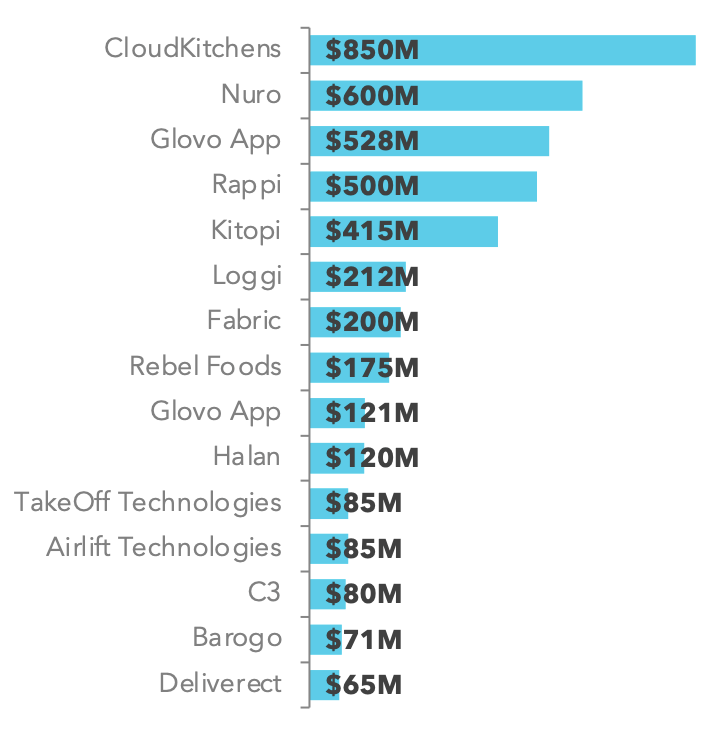[ad_1]
Data Snapshot is a regular AFN feature analyzing agrifoodtech market investment data provided by our parent company, AgFunder.
Click here for more research from AgFunder and sign up to our newsletters to receive alerts about new research reports.
Investments in Cloud Retail Infrastructure grew 97.5% YOY to $4.8 billion in 2021, according to AgFunder’s 2022 AgriFoodTech Investment Report. The figure accounts for 9% of the total $51.7 billion in agrifoodtech investment activity last year.
Cloud Retail Infrastructure was the third most funded agrifoodtech category, and the largest in terms of growth by deal count, which increased 61% over 2020. Investments in the sector grew more than 97%, pulled up by four deals north of $500 million.
According to AgFunder, the Cloud Retail Infrastructure category includes on-demand enabling tech, ghost kitchens, and last-mile delivery robots and services. Reflecting that, top deals for Cloud Retail Infrastructure were ruled largely by ghost kitchen operations, fulfillment and logistics, robotics, and food delivery.

Top Cloud Retail Infrastructure Deals
Ghost kitchens provider from Uber founder Travis Kalanick CloudKitchens topped the list with its $850 million raise at the end of 2021; recent reports reveal that Microsoft was an investor in the round. The round, which was a combination of debt and equity, tripled the company’s valuation to $15 billion.
Two robotics-focused companies also landed rounds above the $100 million mark. Autonomous delivery company Nuro had the second-highest deal in the category with its $600 million Series D raise. Fabric, which runs a robotic fulfillment system for e-commerce including grocery, raised $200 million.
Speedy delivery startup Glovo did two fundraises in 2021, a $121 million investment from Swiss real estate firm Stoneweg and a $528 million Series F round. India’s Rebel Foods joined the ‘unicorn club’ when it raised $175 million in a round led by Qatar Investment Authority (QIA).
Where are they now?
The sector hasn’t been totally immune to the impacts of the current downturn. Like other consumer-facing downstream startups, some Cloud Retail Infrastructure companies are feeling the impacts of inflation, ongoing supply chain chaos, and a general cooling of investor sentiment.
Both Fabric and Nuro made staff cuts recently, with the former laying off 40% of its staff and the latter laying off employees in multiple markets. Nuro also shuttered its Phoenix, Arizona depot as part of the company’s broader refocus on tele-operations.
Glovo, which Delivery Hero acquired a majority stake in at the start of 2022, cut nearly 40% of employees from Foodpanda’s Romania office after acquiring it.
Most ghost kitchens operators on the top deals list have yet to announce any widespread shutdowns or cuts.
Unlike some of the more climate-focused upstream startups, downstream agrifood technologies sometimes become ‘nice-to-have’ products and services in times of economic uncertainty. That’s certainly been true of categories like e-Grocery and restaurant tech, which have also seen their fair share of layoffs and shutdowns recently.
The same is true for all of these downstream categories: startups will need to shore up their businesses to prove their long-term value (and profitability) in order to weather the current downturn.
[ad_2]
Source link

